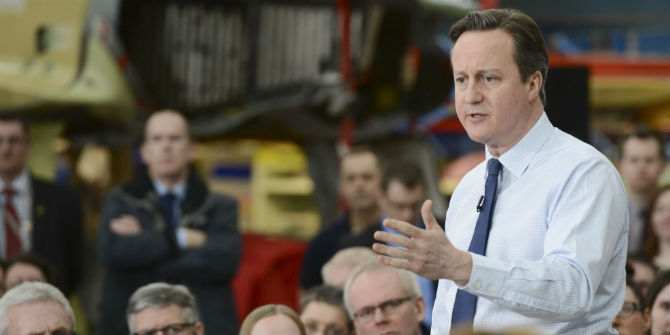 For many Britons, everything was better in the past. Sophia Gaston writes that this is partly because governments have not always been successful at guiding citizens through times of social and economic change. She examines nostalgia as a political force in Britain and explains why politicians must address, rather than avoid questions about patriotism and identity.
For many Britons, everything was better in the past. Sophia Gaston writes that this is partly because governments have not always been successful at guiding citizens through times of social and economic change. She examines nostalgia as a political force in Britain and explains why politicians must address, rather than avoid questions about patriotism and identity.
The study of nostalgia inevitably creates a rather bleak historical record of the present. While warm reflections on the past are a natural human inclination, it is an acute dissatisfaction with the current status quo, coupled with a vivid fear of the future, which together compel the desire to restore the social and economic conditions of the past.
With 63% of Britons believing that the country is in a state of decline, it is here that nostalgia can become a more dangerous political force, and a more urgent phenomenon to study. Not only because it reveals that citizens perceive the nation to be ‘broken’ in some fundamental way, but because the remedy in which they find comfort and recourse from these problems is not the hope of transformative change, but the restoration of a lost society. In effect, the propensity to believe in the ‘doctrine of progress’ has evaporated.
The processes that have led citizens to feel that Britain has lost its way have been slow to develop, but their consequences now feel unwieldy and irrepressible. While Britons’ level of trust in business, politics, and the media has been worrisomely anaemic for some time, what is special about this moment is the success of political campaigns harnessing this fertile ground of dissatisfaction to sell the past as the best model for the future.
The shock inspired by the sight of advanced democracies turning away from the orthodoxy of capitalist liberalism and veering towards nativism and protectionism has necessarily triggered alarm bells throughout the West. While nostalgia has always held a foot in British politics, our contemporary elections risk descending into a battle between competing nostalgic visions.
Exasperated column inches have struggled to make sense of this most profoundly emotional force seemingly corrupting politics and intoxicating society. The Right condemns the fantastical delusions of re-nationalisation and the Left decries a bigoted, misogynistic vision of a 1950s fairy tale, and neither’s disdain convinces the other to turn towards their kind of progress. If we accept that nostalgia stands as a symptom of a contemporary malaise, dismissing its expressions becomes a self-destructive game, shielding ourselves to the causes in which lie its potential responses.
When we give citizens the opportunity to explain the myriad factors that have shaped their own opinions, it becomes difficult to dismiss the pull of the past as entirely feeble nor irrational. 71% of Britons believe their communities have declined over the course of their lifetimes, and 55% think that job opportunities have shrunk. We must accept that even in our dynamic, prosperous, innovative nation, there are citizens who have experienced some genuine sense of material loss – of security, of prospects, of status, of representation.
Governments have not always been successful at guiding citizens through times of change, and every new economic and social transformation has spawned winners and losers. For our societies to function, citizens need to be open to change, but they also need to be supported along the way.
It is certainly true that many other citizens also susceptible to nostalgic messages do not live in forgotten de-industrialised towns; perhaps, they are even relatively economically secure. They speak of the cumulative ‘stress’ of constant adaptation to evolving social norms, and of a political environment that prioritises ‘the issue of the day’ over long-held values. Where every advancement of social liberalism is not rewarded with rest and contentment, but rather spawns new campaigns to overthrow yet another set of norms.
For these citizens, the evolving mores of political correctness, the ‘ideology’ of multiculturalism, and the ensuing softening of nationalism have been immensely confusing. As the rights and standing of minority groups has risen, it has felt as though their own stake has eroded. For those who have benefited from or welcomed the ‘opening’ and diversification of our societies, it can be difficult to imagine this liberal age as time of loss. But for many citizens, the national story, the bulwarks from which they have drawn pride and safety, have become less prominent and, they perceive, less favoured.
These anxieties, while less material, are by no means less consequential. If the deep scars of de-industrialisation reflect failures of public policy, then the widespread cultural and social insecurities of citizens synthesise a capitulation of political leadership: 55% of citizens believe the government has not done enough to promote traditional British values.
The national story politicians have tried to weave during a time of immense change has been exposed as febrile – insufficiently robust, mobilising, and securitising. These fundamental questions, about pride, patriotism, and identity in an age where community is no longer defined by the physical proximity but by the proximity of the mind’s shared values, have not been answered. Unless politicians can forge a convincing new narrative for citizens to draw strength from, they will lose the mandate to compel Britain into the future.
__________
Note: the above draws on the author’s paper (with Sacha Hilhorst) for Demos.
 Sophia Gaston (@sophgaston) is a social and political researcher.
Sophia Gaston (@sophgaston) is a social and political researcher.
All articles posted on this blog give the views of the author(s), and not the position of LSE British Politics and Policy, nor of the London School of Economics and Political Science. Featured image credit: Pixabay (Public Domain).








Learned Friends,
I think it is a little known fact that behind the wish of many Britons to leave the EU was a feeling of having been let down by EU-critical if not outright anti-EU forces within a number of other countries notably Denmark, Sweden and Holland.
As a member of the youth wing of the Danish Social-Liberal Party (Radikale Venstre) I took part in the campaign against Denmark joining the then EEC. To this day I still believe that some of the criticisms we levelled at the EEC still hold true, especially the socalled ‘democratic’ deficit, the desire on the part of the EEC/EU bureaucracy to streamline economic life across the continent at the expense of deep rooted, century old national and local customs and beliefs.
Danes were seemingly persuaded by the argument that if the UK – one of the country’s biggest trading partners – joined, Denmark would also have to and the rest is history. However, we did feel that the blow was softened by the hope and belief that the UK would be a partner in efforts to minimise the democratic deficit and reduce the streamlining. Some sections of the populations in the said countries undoubtedly regret that UK seems to have given up these efforts.
On the other hand many British politicians seem to have come to the conclusion that the efforts were pointless. The Labour MP Gisela Stewart expressed the view that EU is governed by elderly statesman with a political view of Europe rooted in history before the Second World War if not earlier, rather than in the 21st century and who are unwilling to let that view be challenged.
When the UK then sought to change status quo and hoped for support from – among others – the said countries, they saw the continental political establishment pulling together and no support forthcoming. The inevitable conclusion would therefore be that the EU would not change and there was no point in remaining a member.
However, my problem is that apart from David Cameron’s ill-fated attempt at change during the months leading up to the referendum, I do not know of any other case where the UK may have been let down. Can any of the readers of this letter help me? I look forward to your comments, but I cannot offer anything other than my sincerest gratitude in return.
Knud
http://discovery.nationalarchives.gov.uk/details/r/C13318082#imageViewerLink
I think I might have not posted this link
Sadly what most believe is true, Britain is in decline. Since the 1970s Neo-Liberal theology has ruled across the political spectrum since Milton Frieman sopread his gospel, all three major parties fell under its spell.
In the 1980s to the present day rabid neo-liberalism is dismantling the state whilst people people are looking the other way, all thinking things will get better soon, but never does and the real outcome will be a greater disaster than I think the writer could possibly imagine.
For nostalgic messages to take hold in peoples imagination there has to be an element of truth in it. Yes we were better off in the 1970s than we are today, the facts are there for all to see, Neo-Liberal politicians positively decided to shrink the state and with it, the well being of its citizens, some politicians were misguided in their belief and possibly knew no better, but today we have the evidence that there was a deliberate agenda that has carried on to this day. I have never witnessed the level of corruption in politics as there is today, politicians appear to lie with impunity, in the 1970s and before they would have resigned for far less.
As a piece of useful research, perhaps these two documents could expose the actual agenda for you so that you can understand, how things came to pass, and why Britain’s trade unions have been relegated over time.
Nicholas Ridley’s 1977 paper on how the Tories would dismantle the nationalised industries, using the arms of the state to break strikes and undermine the Unions, use contractors to break through picket lines, and change the nature of the nationalised industries into profit making institutions that returned profit to the treasury whilst not getting anything back to reinvest in those industries.
http://fc95d419f4478b3b6e5f-3f71d0fe2b653c4f00f32175760e96e7.r87.cf1.rackcdn.com/FABEA1F4BFA64CB398DFA20D8B8B6C98.pdf
The next paper is a national archive document, Margaret Thatchers secret 1982 cabinet papers, which spells out in detail of how the Tories will dismantle the state, selling off schools, the NHS and public services into the private sector.
http://discovery.nationalarchives.gov.uk/details/r/C13318082#imageViewerLink
All of these actions as well as entry into the EU has destroyed our manufacturing base, and these documents show why people claim that these politicians are not listening to them, of course they are not listening, they have a totally different agenda to that of ordinary people.
I do hope that change for the better comes soon, as we are seeing today in the United States, a top republican has been beaten at the polls by an openly socialist candidate and Bernie Sanders supporter.
.
Nostalgia isn’t what it used to be, but being nostalgic for a period when we were not governed by a corrupt democratically deficient unelected committee in Brussels for the benefit of Germany is understandable.